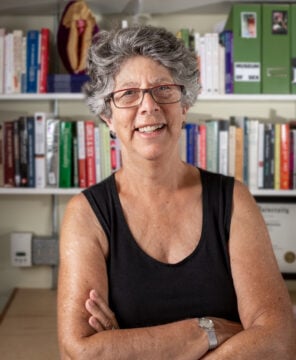Old people and sex. Old people do have sex. And if they aren’t having it, many are still thinking about it, longing for it, and desiring some kind of intimacy and connection. Yet many clinical and administrative leaders feel ill-equipped to handle these situations.
Longing for connection. The Harvard Study of Adult Development has been tracking the lives of the same adults since 1938. They’ve found that the one ingredient in life that brings people the most happiness is connection. It also turns out that the people who were most satisfied in their relationships at 50 were also the happiest at 80. Dr. John DeLamater, an eminent sex researcher, found that older adults are having – and enjoying – sex well into their 80s. Much of the prior sexuality research on older adults focused solely on their medical problems: medications, hormone levels, chronic pain, and illnesses. But that only described part of the entire human experience. What DeLamater and colleagues found was astounding. The major influences on the stirrings in the loins of old people are threefold: (1) good physical and mental health, (2) the presence of a sexual partner, and (3) positive attitudes about sex. Dr. Beverly Whipple, pioneer sex researcher on women’s sexual health and responses, was the first author on a study of the health benefits of sexual expression and found many positive health benefits to regular sexual expression.

Imagining romance between older adults. If the research says that old people are having sex, it’s good for them, and they’re having a good time, why is it so difficult to imagine intimacy, sex, and connection for older people across the lifespan? Adding the prospect of dementia complicates the conversation even further. But if we can’t imagine this life for our elders and we can’t talk about the possibility of sex and romance between older adults, then we’re denying them lives of dignity and pleasure at a time when they need every positive reason to live. Why put an expiration date on sex?
Obstacles along the road to intimacy. There’s an old adage that youth is wasted on the young. Among the benefits to being old are precisely the ingredients that are needed for a deep and intimate sexual life: openness, authenticity, and a real appreciation for connection. Yet every time I conduct an assessment of a senior living community’s needs, similar obstacles emerge:
- The adult son who’s afraid his widowed mother is about to get fleeced yet she claims she’s fallen head over heels in love with a new man.
- Administration and staff running interference when relatives visit a male resident whose wife has dementia when he’s having sex with a different woman.
- The older gentleman who greets his guests naked causing much discomfort to clinicians, residents, and visitors.
- The LGBTQ individual who is afraid to lead an authentic life for fear of reprisal among other residents and staff.
Residents are asking. Whenever I speak to residents, I get their questions. Like the woman who’s been married for 50 years and wants to know how to have sex with her husband despite his physical limitations. Or the widow who was married for 46 years to the same man and wants to know whether she might now have an intimate relationship with a woman given the lack of men in her building. Or the man who wants to have sex with his wife but he’s not sure she can give consent any longer due to her advancing dementia. I ask these brave souls to look deeper inside themselves and focus on who they see themselves as, not what the rest of the world might assume. I offer the latest research, accessible resources, and an open mind. For painful intercourse, there is the alternative of outercourse. For dementia, we need assessments, consults, and conversations in each senior living community. This means training about sex, boundaries, consent. But we can’t do it in a piecemeal basis.
Take a wellness approach. It’s time we take a wellness approach toward curious and consenting older adults who want to live full and complete sexual lives, especially in senior living communities. As it stands now, the responsibility largely falls on nurse’s aides, who are making on-the-spot decisions when a sexuality-related incident occurs. That’s not just unfair to them, it also means that the staff member’s individual values are the values that will prevail in any given moment. We need a wider lens. Family members, administrators, and staff know that old people are having sex. Yet few leaders have addressed it in a consistent way. Sexuality needs to become a part of a community’s approach to wellness.
Alex and Jan’s story. Alex was 95 and Jan was 92 when they met and fell in love at an assisted living community. They both were diagnosed with dementia. One day, Alex’s son walks in on them enjoying a sexual moment in the privacy of Alex’s bed. The son was enraged and beseeched the staff to never leave Alex and Jan alone together again. Alex’s son moved Alex out of the facility. As a result, Jan stopped eating, lost 21 pounds, was treated for dehydration and depression. Jan sat next to a window, looking and waiting for Alex to return.
Translate problems into solutions. If clearly-defined organizational values had been translated into policy and someone had spoken to the staff, the family member, and the couple themselves, Alex and Jan’s story could have ended very differently. Clinical and administrative leaders need to translate problems into solutions and tackle a taboo topic across disciplines. Administrative leaders need to look at the organizational culture, policies, training, and resident rights. Clinical leaders need to teach staff to understand and discuss older adults’ sexuality, their cognitive function, and consent. When senior living communities address the dignity of sexual expression, residents will be safer, happier, and healthier. Overall wellness is certain to improve.
FOR MORE INFORMATION ON THESE ISSUES OR TO ASK A QUESTION, PLEASE WRITE TO DR. FLEISHMAN.


 Dr. Jane Fleishman
Dr. Jane Fleishman